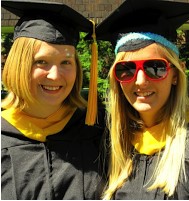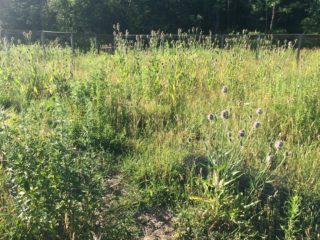In October of 2015, Siri Chillara, an undergraduate student at the University studying chemical engineering, founded The Swaraj Project, an urban micro-farm. The Swaraj Project is located at the site of the former UR Microfarm, behind the graduate housing at Whipple Park. Chillara started the project through a fellowship with the M.K. Gandhi Institute for Nonviolence, a non-profit organization that collaborates with local organizations, academic institutions, students and committed peacemakers in areas such as nonviolence education, sustainability and environmental conservation, and the promotion of racial justice.

Chillara started the project after taking Leila Nadir’s Food, Media, and Literature class. “The class changed my life,” says Chillara. “We learned about the industrial food system, Ag Gag and Farm Bill (amongst many other bills and policies), and hidden externalities- all of which showed me the corrupt ways of big business and politics. It was frustrating. I was disillusioned.”
When Chillara learned about the M.K. Gandhi Institute for Nonviolence Fellowship– a year-long internship for Rochester-area undergraduate and graduate students to explore how nonviolence may be applied to a social justice issue they are passionate about- she knew it was her opportunity to act. In advocating why this farm project was necessary to fellow environmental groups on campus, the mission statement of The Swaraj Project was born.
“Our farm was founded on the realization that most people our age don’t have a personal stake in what they eat. They neither know their farmer and his or her toil nor the soil that must thrive to nourish them. In The Swaraj Project, we hope to start a network of urban farmers who are equipped and can equip others with the ideas of permaculture to empower both themselves and their communities through creative but sustainable farming.” – Siri Chillara

The Swaraj Project was created on an overgrown lot which had been used as a garden in past years. Undergraduates Caitlin Smigelski and Annalise Kjolhede first used the plot as a small garden to provide food to the University community during their Kauffman Entrepreneurial Year. Shortly after graduating, Annalise Kjolhede tragically passed away in a skiing accident. While still an undergraduate, Annalise was featured in several articles about her role as an environmental activist and her work in conducting a survey of community attitudes about fish consumption. As told by project leader Katrina Korfmacher, “Everyone who met her in our work seems to remember her – including some of my community partners who didn’t even work on the fish project, our secretary, and even our PR guy remembers her from the story he did on our project. She certainly made an impact on everyone around her.”
After Smigelski and Kjolhede graduated, the site was turned into the UR MicroFarm which was used to educate middle school students in the Rochester City School District about sustainable farming. However, over time the site was unused and overgrown until Chillara began the idea of The Swaraj Project in 2015. The project’s name “Swaraj” translates to “swa” which means “self” and “raj” which means “rule”. The name is based on the idea that community growth relies on individual effort and shared responsibility.
The initial contributors to The Swaraj Project included Haley Miyaoka, Alexandria Brown, Emily Volk, Max Sheldon, Danielle Gartenberg, and Sadie Dix. Since its creation, many organizations have become involved. The Swaraj Project is now a joint project between the University of Rochester groups Grassroots, GreenSpace, EcoReps, Food Recovery Network, Rochester Center for Community Leadership, Engineers for a Sustainable World and the community groups Community Composting, Urban Agriculture Working Group, and NorthEast Organic Farming Association of New York. Volunteers have also helped during Wilson Day, an annual day of community service for new and incoming University of Rochester students. However, anyone who is willing to work hard and think creatively is welcome aboard, says Chillara.

The initial steps to making The Swaraj Project a successful micro-farm have already been completed. Daikon Radish was planted at the site in order to aerate the densely-packed soil. Permaculture swales have also been built at the site with the help of students from Leila Nadir’s Food Justice, Urban Farming, and Social Practice class. The swales help capture and conserve water. Moving forward, the hope is to make The Swaraj Project a subcommittee of Grassroots, the University’s premier environmental action and awareness group which strives to act on behalf of a sustainable future and to raise awareness of collective and individual responsibilities as stewards of the Earth and its natural environment. “We’re currently in talks with a local company to obtain fresh organic soil for this coming season. We’re also trying to work with students to build a compost tumbler. We’re a new organization, and it just takes time to convince students and administration, mainly, to believe in us,” says Chillara. The goal is to make The Swaraj Project a self-sustaining farm. The produce grown at the site is intended for donation via the Food Recovery Network and for purchase by Dining Services.
Written by Alyssa Lemire, Class of 2017

